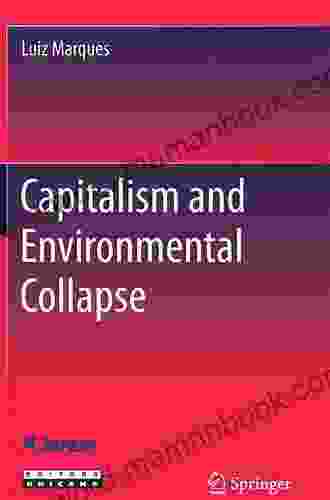Capitalism and Environmental Collapse: A Comprehensive Analysis by Lisa Gardner

5 out of 5
| Language | : | English |
| File size | : | 8662 KB |
| Text-to-Speech | : | Enabled |
| Screen Reader | : | Supported |
| Enhanced typesetting | : | Enabled |
| Word Wise | : | Enabled |
| Print length | : | 857 pages |
Capitalism, a dominant economic system characterized by private ownership of capital and means of production, has profoundly impacted the planet's environmental health. The pursuit of economic growth and profit maximization has led to unsustainable levels of resource extraction, pollution, and habitat destruction. This article explores the intricate relationship between capitalism and environmental collapse, examining the historical, socioeconomic, and ecological factors that contribute to this pressing issue.
Historical Roots
The origins of capitalism can be traced back to the Industrial Revolution, a period marked by the widespread adoption of fossil fuels and the rise of industrial production. Economic growth became the primary goal of societies, driven by technological advancements and increased consumerism. However, this rapid industrialization came at a significant environmental cost. Coal and oil extraction released vast amounts of greenhouse gases into the atmosphere, contributing to climate change. Factories spewed pollutants into rivers and air, causing widespread water and air pollution.
Economic Growth and Resource Extraction
A fundamental tenet of capitalism is the belief in perpetual economic growth. However, the Earth's resources are finite. As economies grow, they inevitably demand more raw materials to sustain production and consumption. This increased demand for resources has led to the overexploitation of forests, fisheries, and other ecosystems. The mining of fossil fuels, such as coal, oil, and gas, has particularly contributed to climate change and air pollution.
Consumerism and Pollution
Capitalism's focus on profit maximization has fostered a culture of excessive consumption. The constant stream of new products and services encourages individuals to purchase more than they need, leading to increased waste production. Disposable products, packaging, and electronic equipment contribute to landfills and pollute oceans and waterways. The production of goods also generates significant emissions, air pollution, and water consumption.
Implications for Environmental Health
The combined effects of resource extraction, consumerism, and pollution have had devastating consequences for the environment. Climate change is altering global weather patterns, leading to more extreme events such as hurricanes, droughts, and heat waves. Biodiversity loss is occurring at an alarming rate, threatening the stability of ecosystems and the livelihoods of millions of people. Air and water pollution pose serious health risks, particularly in urban areas and communities near industrial facilities.
Implications for Human Societies
Environmental collapse poses significant risks to human societies. The disruption of ecosystems affects food security, water availability, and human health. Disasters caused by climate change can displace populations and damage infrastructure. Environmental degradation can also exacerbate social inequality, as the poor and marginalized often bear the brunt of pollution and resource scarcity.
Solutions: Moving Towards Sustainability
Addressing the environmental crisis requires a fundamental shift away from the current capitalist system. Sustainable alternatives include:
* Degrowth: Reducing economic growth and consumption to levels that are sustainable for the planet. * Regenerative Economics: Designing economic systems that support the restoration and regeneration of natural ecosystems. * Circular Economy: Shifting from a linear "take-make-dispose" model to circular systems that minimize waste and resource extraction. * Renewable Energy: Transitioning to renewable energy sources, such as solar and wind power, to reduce greenhouse gas emissions. * Sustainable Agriculture: Promoting agricultural practices that protect biodiversity, soil health, and water resources.
The relationship between capitalism and environmental collapse is undeniable. The pursuit of economic growth and profit has led to unsustainable levels of resource extraction, pollution, and habitat destruction, threatening the health of the planet and the well-being of human societies. A fundamental shift towards sustainable alternatives is imperative to avert the catastrophic consequences of environmental collapse. By embracing degrowth, regenerative economics, and circularity, we can create a future where economic prosperity and environmental health can coexist harmoniously.
Author Bio: Lisa Gardner is an environmental scientist and writer with a passion for exploring the intersection of human societies and the natural world. Her work has been published in various scientific journals and popular media outlets.
5 out of 5
| Language | : | English |
| File size | : | 8662 KB |
| Text-to-Speech | : | Enabled |
| Screen Reader | : | Supported |
| Enhanced typesetting | : | Enabled |
| Word Wise | : | Enabled |
| Print length | : | 857 pages |
Do you want to contribute by writing guest posts on this blog?
Please contact us and send us a resume of previous articles that you have written.
 Top Book
Top Book Novel
Novel Fiction
Fiction Nonfiction
Nonfiction Literature
Literature Paperback
Paperback Hardcover
Hardcover E-book
E-book Audiobook
Audiobook Bestseller
Bestseller Classic
Classic Mystery
Mystery Thriller
Thriller Romance
Romance Fantasy
Fantasy Science Fiction
Science Fiction Biography
Biography Memoir
Memoir Autobiography
Autobiography Poetry
Poetry Drama
Drama Historical Fiction
Historical Fiction Self-help
Self-help Young Adult
Young Adult Childrens Books
Childrens Books Graphic Novel
Graphic Novel Anthology
Anthology Series
Series Encyclopedia
Encyclopedia Reference
Reference Guidebook
Guidebook Textbook
Textbook Workbook
Workbook Journal
Journal Diary
Diary Manuscript
Manuscript Folio
Folio Pulp Fiction
Pulp Fiction Short Stories
Short Stories Fairy Tales
Fairy Tales Fables
Fables Mythology
Mythology Philosophy
Philosophy Religion
Religion Spirituality
Spirituality Essays
Essays Critique
Critique Commentary
Commentary Glossary
Glossary Bibliography
Bibliography Index
Index Table of Contents
Table of Contents Preface
Preface Introduction
Introduction Foreword
Foreword Afterword
Afterword Appendices
Appendices Annotations
Annotations Footnotes
Footnotes Epilogue
Epilogue Prologue
Prologue Gary Snyder
Gary Snyder Yei Theodora Ozaki
Yei Theodora Ozaki Gavin De Becker
Gavin De Becker Vladimir Petrov
Vladimir Petrov Tammy Spears
Tammy Spears Rw Holmen
Rw Holmen David Boyne
David Boyne G Keith Parker
G Keith Parker Zacharias B Maroulis
Zacharias B Maroulis Jorge Morel
Jorge Morel Stephen Peace
Stephen Peace E J Loveson
E J Loveson Michael G Lafosse
Michael G Lafosse Lisa Shea
Lisa Shea Shane Lambert
Shane Lambert Ellora Sutton
Ellora Sutton Juan Villalba
Juan Villalba Jenna Herbut
Jenna Herbut B R Spangler
B R Spangler Stephanie Foo
Stephanie Foo
Light bulbAdvertise smarter! Our strategic ad space ensures maximum exposure. Reserve your spot today!

 Jaylen MitchellLegend of the Arch Magus Ascension: A Comprehensive Exploration into the...
Jaylen MitchellLegend of the Arch Magus Ascension: A Comprehensive Exploration into the... John UpdikeFollow ·3k
John UpdikeFollow ·3k Giovanni MitchellFollow ·13.2k
Giovanni MitchellFollow ·13.2k Brian BellFollow ·15.5k
Brian BellFollow ·15.5k George R.R. MartinFollow ·2.3k
George R.R. MartinFollow ·2.3k Steven HayesFollow ·11.8k
Steven HayesFollow ·11.8k Jan MitchellFollow ·17.4k
Jan MitchellFollow ·17.4k Elias MitchellFollow ·5.4k
Elias MitchellFollow ·5.4k Joe SimmonsFollow ·14.3k
Joe SimmonsFollow ·14.3k

 Bryce Foster
Bryce FosterViolin Is Easy: A Comprehensive Guide for Beginners
The violin is a...

 Cristian Cox
Cristian CoxThe True Story Of The Ivy League Cowboys Who Raided The...
In the early 2000s, a group of Ivy League...

 Ken Follett
Ken FollettUnraveling the Enchanting World of Menewood: A...
Embark on an enthralling...

 Phil Foster
Phil FosterNorth Poems by Seamus Heaney: An Exploration of Place,...
Seamus Heaney's North...

 Jack Butler
Jack ButlerFleeting Encounters: The Enigmatic Transience of Maria...
In the annals of literary history, fleeting...

 Eliot Foster
Eliot FosterA Haiku Summer: Capturing the Essence of the Season in...
Summer is a time of warmth,...
5 out of 5
| Language | : | English |
| File size | : | 8662 KB |
| Text-to-Speech | : | Enabled |
| Screen Reader | : | Supported |
| Enhanced typesetting | : | Enabled |
| Word Wise | : | Enabled |
| Print length | : | 857 pages |










